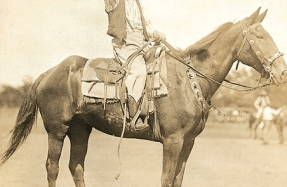
On the evening of June 3, 1889, Patrick Cleary grabbed a hatchet from beside the courtroom woodstove and burst outside into the darkness. Some later suggested Sheriff Thomas Boyle had intentionally released his prisoner, believing Cleary stood a better chance of escaping the lynch mob gathered outside than Boyle had of stopping them. Just that morning the sheriff had rescued a juror from a crowd of angry citizens demanding to know why the man had voted to acquit Cleary of murder. Many in the crowd believed Cleary had bribed the man, and some thought the juror himself merited lynching.
Cleary was struck by a bullet as he ran across the courthouse lawn, though it remained unclear whether the shot came from startled guards or angry citizens. Regardless, the vigilantes subsequently captured and lynched the wounded would-be escapee. The history of the Old West is replete with gunfights, jailbreaks, lynchings, murder convictions and even hung juries. But the Cleary case in Lincoln County—the one in Kansas, not the one in New Mexico Territory that witnessed the 1878 Lincoln County War—featured all of those elements in one violent saga.
Over the years neighboring ranchers and fellow Civil War veterans Patrick “Patsey” Cleary and Jesse Turner had grown to hate one another. In 1888 the bad blood between them, brought to a head in a dispute over watering rights for their cattle herds, finally erupted. Cleary was in his mid-40s, Turner about 60. They had grown their herds to 300 head and 100 head, respectively.
On January 2 Cleary happened across Turner’s 12-year-old son, Charles, and 15-year-old son, Isaiah, tending the family herd at a watering place on the west branch of Elkhorn Creek. Cleary told the boys to inform their father




